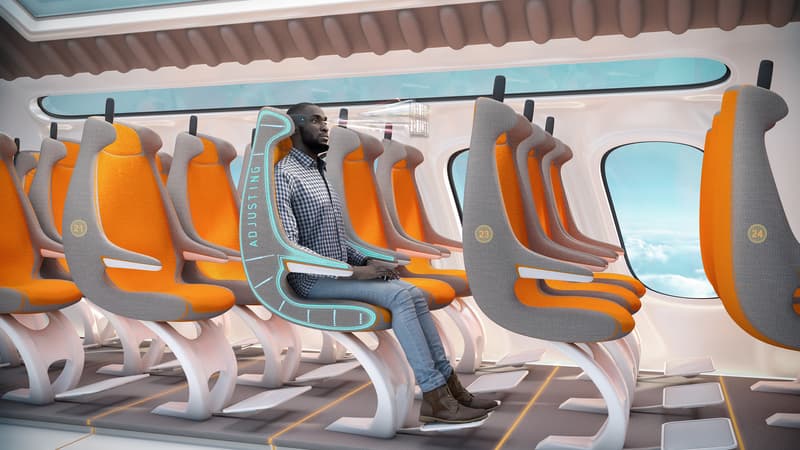If the aircraft is particularly criticized today for its carbon footprint (however, it represents 2 to 3% of global emissions), everything indicates that its use is destined to progress in the coming years, driven in particular by China.
So how will the aircraft evolve in the coming years? On the one hand, the industry is preparing to transform (cleaner fuels, cheaper planes, etc.). On the other hand, the travel experience could also change profoundly.
In any case, this is the opinion of easyJet, which asked several experts and futurologists led by Birgitte Andersen, a professor at Birkbeck College London, to imagine air travel in 2070 in a foresight exercise: “2070: The Future Travel Report “.
“These next 50 years will bring the greatest technological advances we have ever seen in travel and tourism. Some aspects of our vacations will be transformed beyond what we know,” he summarizes.
We will go to the airport by flying taxi.
Between your home and the seat of the plane, hours can pass between public transport and boarding times. For experts, these “irritants” could be a thing of the past.
In particular thanks to flying taxis or eVTOL (vehicle with vertical takeoff and landing, editor’s note). “Travel to the airport will be faster and more convenient than ever with 85% of passengers arriving via eVTOL from their home to the terminal.
These flying taxis are far from science fiction. In Paris, we could discover them for the 2024 Olympic Games with the aim of launching a commercial offer to Ile-de-France airports in 2030.
“If there is so much interest around VTOL, it is not only because it makes you dream, it is because there are intrinsic qualities in the project that explain this mobilization but also the international competition for being one of the areas of the world in which this sector will be structured” , explains Groupe ADP CEO Edward Arkwright.
According to a study by the consultancy Oliver Wyman published in November 2019, the future market for flying taxis it could represent more than 35 billion dollars in 2035 and would affect 60 to 90 cities in the world, and especially the congested megacities of Asia and America.
We will board faster thanks to our cardiac passports
It is still the sequence in which the passenger loses the most time: the security controls before boarding that usually generate long queues. Certain technological innovations are intended to reduce these delays, such as new scanning devices that no longer have to remove liquids and computers from carry-on luggage.
On the identity document control side, the report’s experts envision the generalization of “cardiac passports” that “will replace the traditional passport, so that passengers quickly cross their airport. Like fingerprints and retinas, the “Every person’s heart rate is unique. Cardiac signatures and biometric details of passengers will be recorded in a global system in the same way that fingerprint scanning technology works today.”
But biometrics could go further, at the risk of making defenders of individual liberties scream.
“The airport security infrastructure will be incredibly sophisticated,” adds biofuturist Dr. Melissa Sterry. “Upon entering the airport, facial recognition software will have registered your arrival, identified you, matched you with your flight reservation and sent messages to your personal devices. Your luggage, with data tags embedded in your bags, are automatically downloaded from the train. or taxi and sent directly to the correct aircraft, undergoing biological, chemical and imaging analysis along the way.”
We will use the airport as a vacation spot in its own right.
“Vous voudrez probablemente toujours arriver tôt à l’aéroport, car c’est là que l’expérience des vacances begins. L’aéroport du futur will become a destination, an endroit où les clients voudront passer du temps” estimate the professor Braithwaite dans le relationship.
It is really about transforming the sad airports into places of “hospitality”, this is also the intention of the ADP group with its Extime brand deployed in Paris-Roissy.
Objective: the waiting time generally perceived as irritating or even stressful by passengers through the experience of catering or shopping in stores, games for children, furniture, lounges and accompaniment…, for all passengers.
We’ll sit in sensory seats
Airplane seats that are too narrow, not deep enough, stiff, and economy class are the subject of all criticism. In this report, experts bet on the emergence of “sensory biomimetic ergonomic airplane seats with intelligent materials (that) adapt to the shape of the body, height, weight and temperature of the passengers” and not only for the executive class.
“Seats will no longer be ‘one size fits all,’ instead you’ll be able to book the type of seat that’s best suited for your body type, height, and build. Smart materials could meet your personal temperature preferences, you cool or warm, and include antimicrobial elements for better hygiene”, we can read.
In addition, we will no longer gouge our eyes out from small screens to enjoy a movie during our flight. In the future, entertainment content will be accessible through VR headsets “or other optoelectronic devices”, therefore directly in front of the eyes in immersive mode.”
Expected news…
Parallel to this study, the low-cost airline asked 2,000 Britons about these innovations, for 75% of them, they could encourage them to fly more often. Passports with cardiac biometrics are the most anticipated.
“The results of this report are incredibly exciting and I am confident that easyJet will continue to lead the way in making many of these predictions come true for tourists in the future,” said Johan Lundgren, easyJet CEO.
Source: BFM TV


